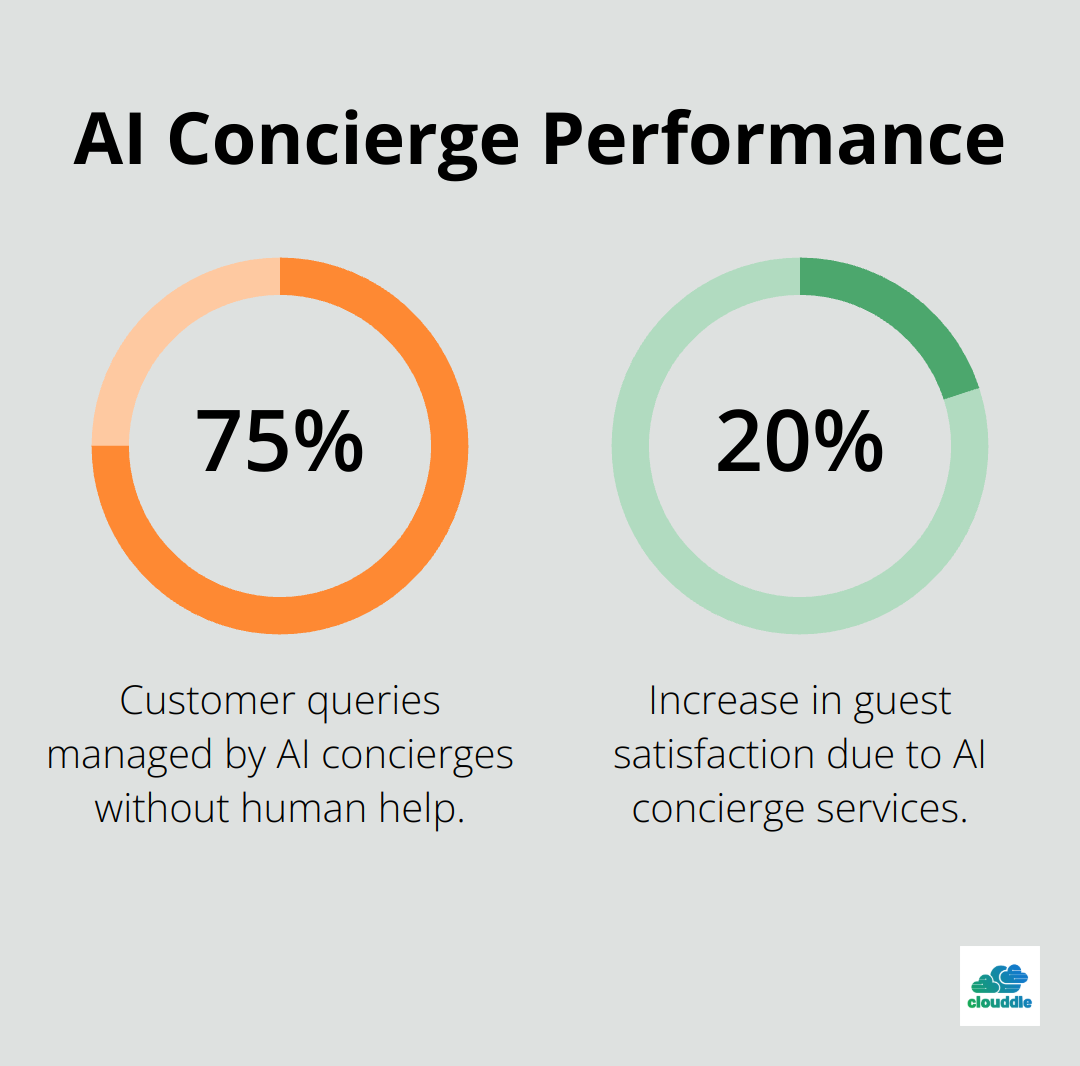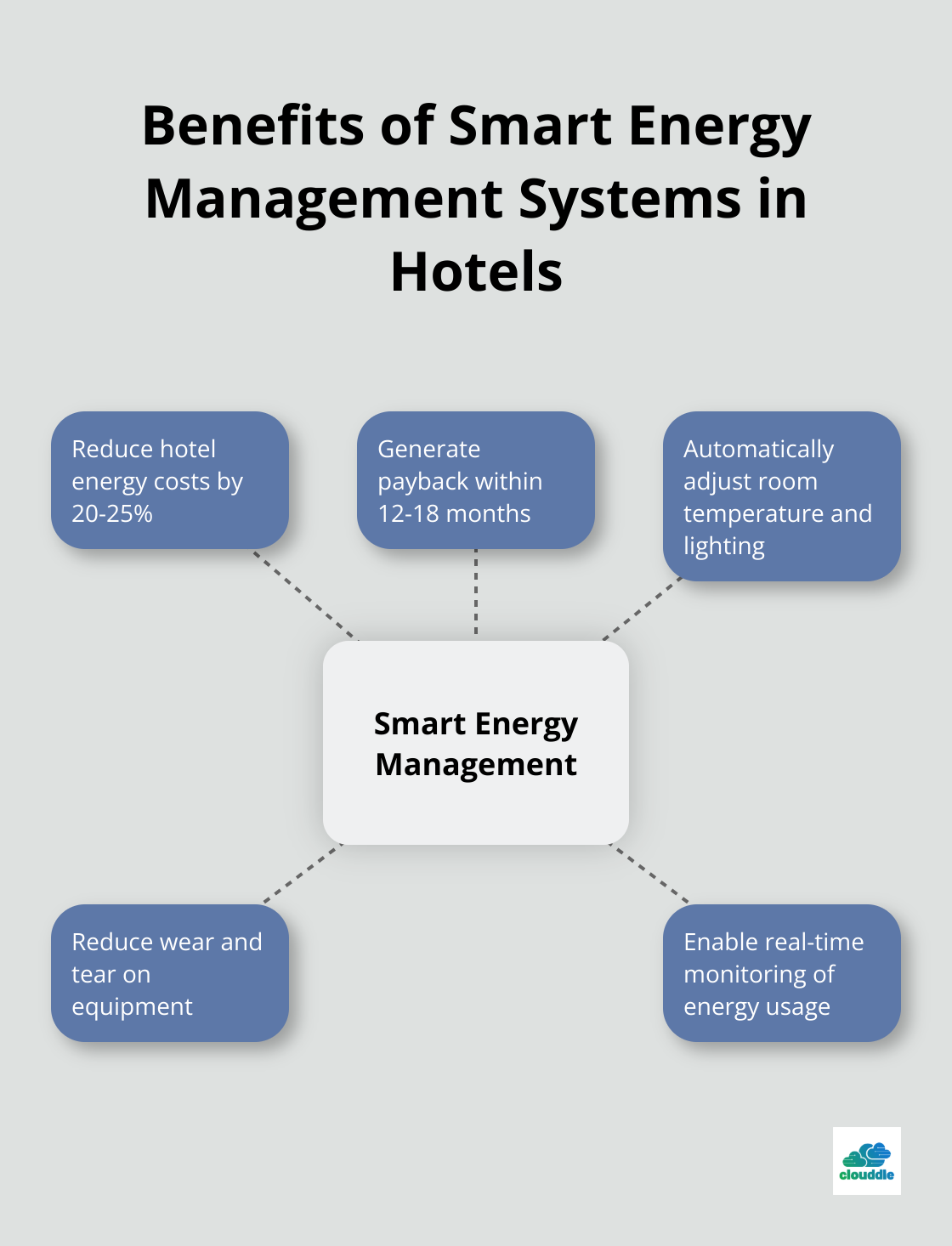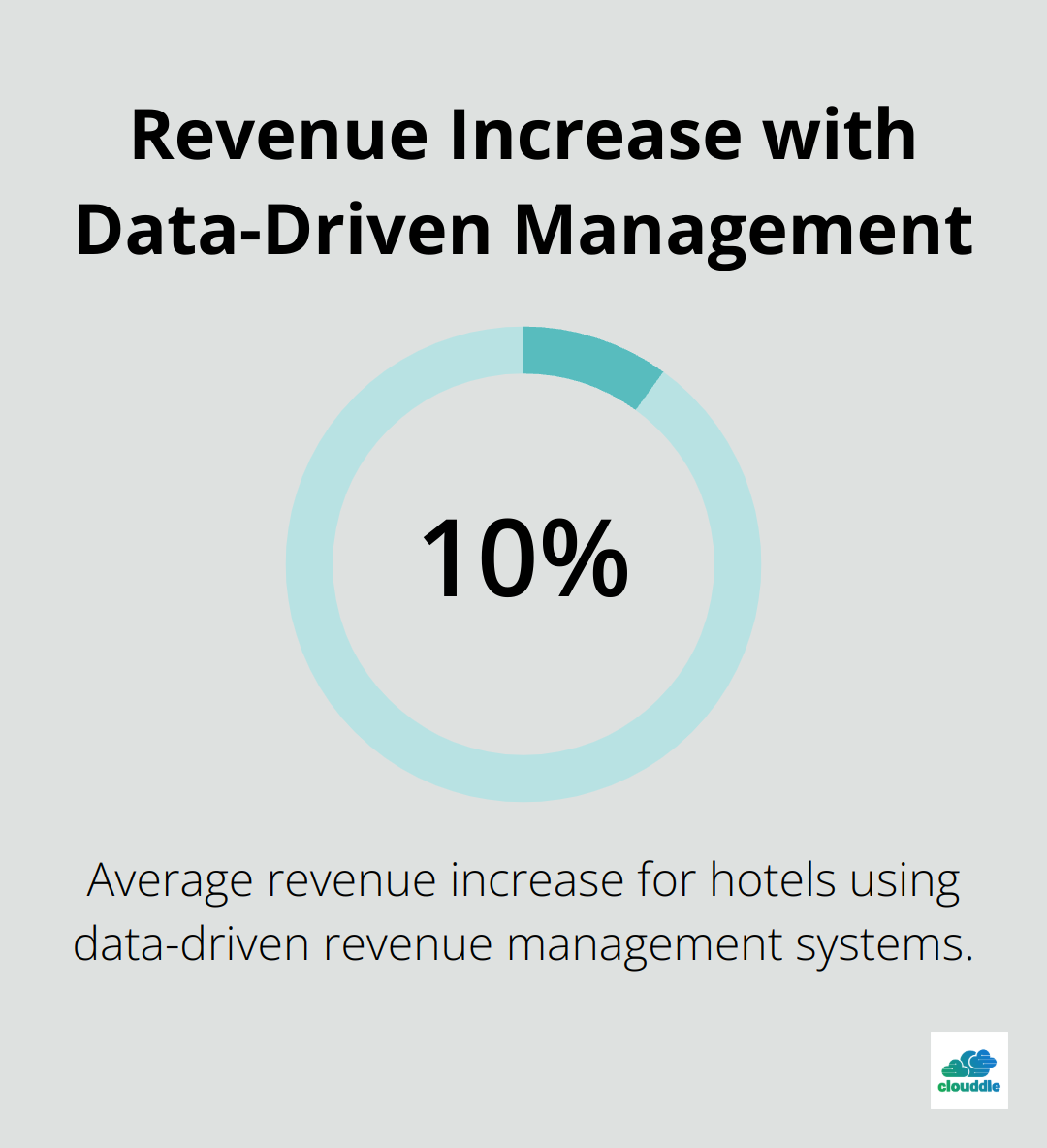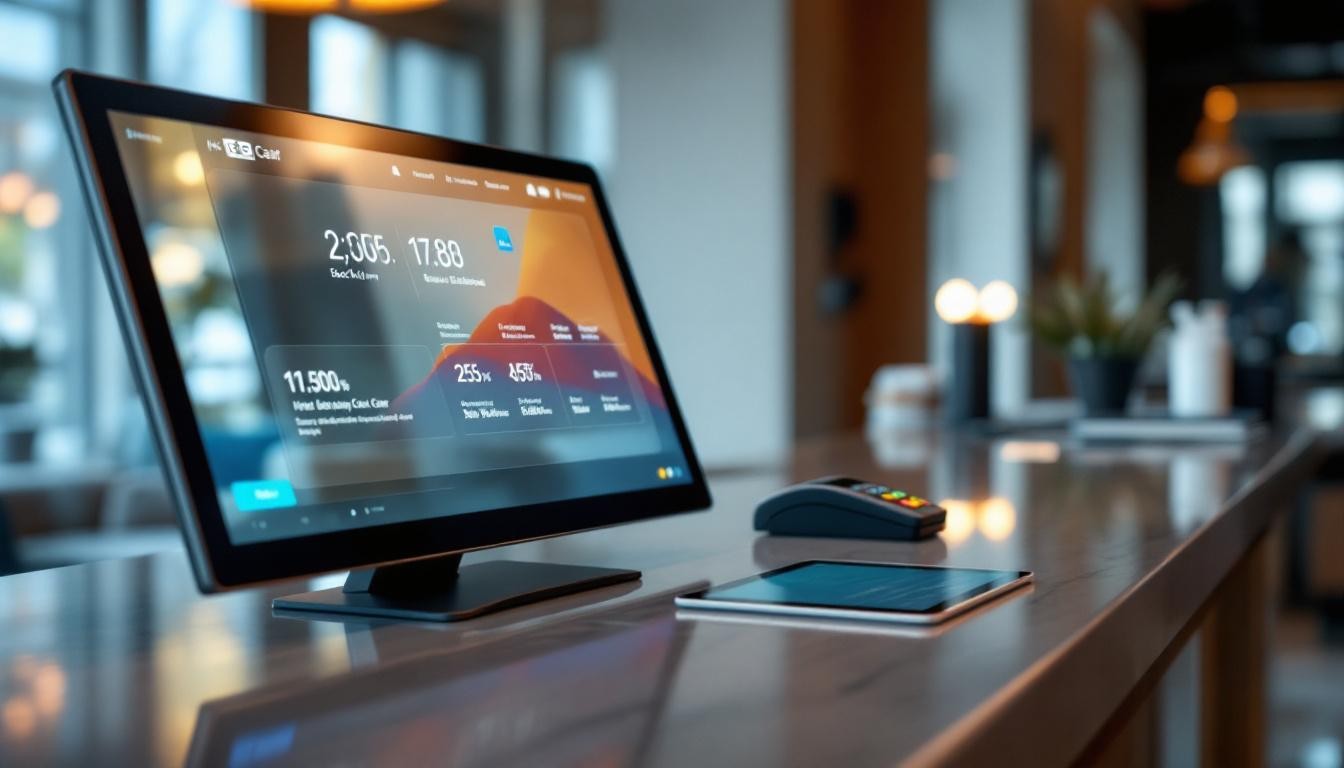The information technology hospitality industry is undergoing a massive transformation. From mobile check-ins to AI-powered concierge services, tech innovations are reshaping guest experiences and operational efficiency.
At Clouddle, we’ve witnessed firsthand how these advancements are revolutionizing hotels, resorts, and restaurants. In this post, we’ll explore the game-changing IT solutions that are setting new standards in hospitality.
How IT Solutions Transform Guest Experiences
The hospitality industry witnesses a seismic shift in guest interactions, thanks to innovative IT solutions. These technologies fundamentally change how hotels operate and serve their guests.
Mobile Check-In: The New Arrival Standard
Long queues at reception desks become a thing of the past with mobile check-in. Hotels that implement digital keys report a reduction in front desk traffic, allowing staff to focus on more personalized guest interactions.
In-Room Tech: Customized Comfort at Scale
Personalization emerges as the new luxury in hospitality, with in-room technology making it possible on a large scale. Smart room systems allow guests to control everything from temperature to lighting with their smartphones or voice commands.
Marriott’s IoT Guestroom Lab leads this trend, testing voice-activated room controls and personalized presets for frequent guests. These systems enhance comfort and contribute to energy efficiency.
AI Concierges: Round-the-Clock Personalized Assistance
AI-powered concierge services revolutionize guest communication. These systems handle a wide range of guest inquiries, from restaurant recommendations to local attractions, instantly and in multiple languages.
Data shows that AI concierges like Velma manage 75% of customer queries without human help, leading to quicker responses and an impressive 20% increase in guest satisfaction.

The integration of these IT solutions creates a seamless, personalized experience that meets the evolving expectations of modern travelers. As the hospitality industry continues to embrace technology, the next frontier lies in enhancing operational efficiency. Let’s explore how IT solutions streamline backend processes and improve overall hotel management.
How Hotels Boost Efficiency with Tech
The hospitality industry embraces technology to streamline operations and enhance guest experiences. Let’s explore some game-changing technologies that revolutionize hotel operations.
Cloud-Based Property Management Systems
Cloud-based Property Management Systems reshape how hotels handle day-to-day operations. These systems integrate reservations, check-ins, housekeeping, and billing into one centralized platform. Cloud-based PMS are cheaper and more efficient than traditional ones, with much less capital expenditure, IT spending, and operational costs.
Modern PMS stand out with their ability to sync with channel managers. This integration allows real-time updates across all booking channels, which reduces overbookings by up to 20%. Hotels can now manage their inventory more effectively, leading to higher occupancy rates and increased revenue.
Smart Energy Management with IoT
Internet of Things (IoT) devices transform energy management in hotels. Smart thermostats, occupancy sensors, and automated lighting systems work together to optimize energy use. Smart energy-management systems can reduce hotel energy costs by up to 20%–25% and generate some of the fastest payback periods in the industry, between 12–18 months.
These systems automatically adjust room temperature and turn off lights when a guest checks out. This not only saves energy but also reduces wear and tear on equipment.

Automated Inventory and Supply Chain Management
Automation streamlines inventory and supply chain management in the hospitality sector. Advanced software systems track stock levels in real-time, automatically reorder supplies when they run low, and even predict future needs based on historical data and upcoming bookings.
A case study from a major hotel chain showed that implementing automated inventory management reduced food waste by 35% and lowered overall inventory costs by 10%. This improves the bottom line and contributes to sustainability efforts.
These systems can integrate with supplier networks, allowing for seamless communication and more efficient procurement processes. Some hotels report reducing their procurement time by up to 40% after implementing such systems.
Data-Driven Decision Making
Hotels now leverage data analytics to make informed decisions. Advanced analytics tools process vast amounts of data from various sources (including PMS, booking engines, and social media) to provide actionable insights.
These insights help hotels optimize pricing strategies, predict occupancy trends, and personalize marketing campaigns. A study by McKinsey found that hotels using data-driven decision-making saw a 5-10% increase in revenue.
Mobile Staff Communication
Mobile apps for staff communication enhance operational efficiency. These apps allow instant communication between departments, real-time task assignment, and quick issue resolution.
Hotels using such apps report a 25% reduction in response time to guest requests and a 15% increase in staff productivity. This improved communication leads to smoother operations and higher guest satisfaction.
As we explore these technological advancements, it becomes clear that the future of hospitality lies in data. The next section will delve into how hotels can leverage data for better decision-making, from revenue management to targeted marketing strategies.
How Data Drives Hospitality Success
Data has become the secret ingredient for success in the hospitality industry. Hotels that harness the power of data analytics gain a competitive edge, make smarter decisions, and deliver exceptional guest experiences. Let’s explore how data-driven strategies reshape the hospitality landscape.
Revenue Management Revolution
Advanced analytics tools have transformed revenue management in hotels. These systems can optimize pricing strategies, enhance guest experience, streamline operations, improve marketing efforts, and enhance overall performance. A study by Cornell University found that hotels using revenue management systems saw an average revenue increase of 10% compared to those relying on traditional methods.

One major hotel chain reported a 7% boost in RevPAR (Revenue Per Available Room) after implementing a data-driven revenue management system. The system’s ability to predict demand fluctuations and adjust prices accordingly proved particularly valuable during peak seasons and special events.
Predictive Maintenance Saves Costs
IoT sensors and predictive analytics change how hotels approach maintenance. Hotels can identify potential issues before they become major problems by monitoring equipment performance in real-time. This proactive approach reduces downtime and extends the lifespan of expensive equipment.
A study finds that companies using IoT-based predictive maintenance experience 20-30% reduced unplanned downtime, which translates to significant cost savings. This proactive approach not only reduces maintenance costs but also improves overall operational efficiency.
Personalized Marketing Through Guest Insights
Data analytics enables hotels to understand their guests on a deeper level, leading to highly targeted marketing campaigns. Hotels can create personalized offers that resonate with individual travelers by analyzing guest behavior, preferences, and feedback.
A boutique hotel chain used guest behavior analysis to tailor its email marketing campaigns. The result was a 35% increase in click-through rates and a 25% boost in direct bookings. The hotel recommended specific amenities and experiences based on each guest’s past preferences, significantly improving engagement and conversion rates.
On-Property Experience Enhancement
Hotels also use data to enhance the on-property experience. For instance, a resort in Hawaii used guest data to customize in-room amenities, resulting in a 15% increase in positive reviews mentioning personalized touches.
Future of Data-Driven Hospitality
The power of data in hospitality continues to grow. From optimizing revenue to predicting maintenance needs and personalizing guest experiences, data-driven decision-making sets new standards in the industry. The future of hospitality belongs to those who can effectively harness and act upon the insights hidden within their data.
Wrapping Up
The information technology hospitality industry has transformed every aspect of guest experiences and operational efficiency. Mobile check-ins, AI concierges, and data-driven decision-making now form the backbone of modern hospitality. Virtual and augmented reality, blockchain technology, and the Internet of Things will soon create smart hotels that anticipate guest needs before they arise.
Hospitality businesses must stay updated with technological advancements to survive and grow in this competitive landscape. Those who embrace innovation will exceed guest expectations, drive loyalty, and increase revenue. Technology adoption is no longer optional but essential for success in the digital era of hospitality.
Clouddle’s Network as a Service (NaaS) solution combines cutting-edge networking, entertainment, and security services for hospitality businesses. We enable hotels to leverage the latest technology without significant upfront investment. Hospitality businesses can focus on creating exceptional guest experiences while we handle the complex IT infrastructure.


